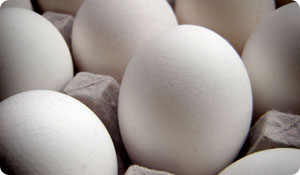
Nutritionally speaking, eggs are a near-perfect food, naturally rich in high-quality protein and containing almost every vitamin and mineral known to be essential for human health. Still, eggs enriched with extra vitamin E and omega-3 fatty acids are available in just about every supermarket. Why mess with mother nature?
Vitamin E, an antioxidant that protects against cell damage, and omega-3-fatty acids, healthful fats that are linked to the prevention and treatment of heart disease, inflammation and other chronic medical conditions, are essential nutrients that are abundant in the food supply. Unfortunately, however, these nutrients are not in the foods most people eat in great quantity, or on a regular basis. That's why supplements containing vitamin E and omega-3's are often promoted and why some food manufacturers choose to enrich their products with these nutrients.
All eggs contain some naturally occurring omega-3 fatty acids; enriched eggs simply contain more. An ordinary egg contains about 50 mg. total omega-3 fats, according to food scientist and registered dietitian, Mary Van Elswyk. Those omega-3's are found only in the yolk, she points out, so that's the part of the egg you have to eat in order to get the benefits. Hens that are fed grains enriched with flaxseed, fish oils or algae get an omega-3 fatty acid boost in their diet that transfers to their eggs. The amount and type of omega-3 fat in enriched eggs varies with the type of feed and the size of the egg and yolk but a large enriched egg can contain 100 to 200 mg of omega-3 fatty acids.
Egg yolks also contain vitamin E, but only in very small amounts. When the vitamin E content of a laying hen's diet is improved, the hen produces eggs that are richer in this vitamin than ordinary eggs. When canola oil or another vegetable oil is added to the hen's feed, the result is an egg that is lower in artery-clogging saturated fats and higher in healthier unsaturated fats.
Other feed ingredients, such as yellow corn and marigold petals, enrich the hen's diet and their eggs with health-promoting phytochemicals known as leutin and zeaxanthin. These substances, normally found only in plant foods such as spinach and other leafy, dark green vegetables, have been shown to help prevent macular degeneration, the leading cause of blindness in older adults.
The cost of supplementing a hen's diet with the right types and amounts of additional ingredients that supply essential nutrients and change the balance of fats is factored into the price of eggs, The result is, naturally, a more expensive egg. But if your diet doesn't routinely include seafood, seeds, nuts, whole grains or other natural sources of Vitamin E, omega-3's and unsaturated fats, enriched eggs may well be worth the price.
Sources:
Jacob, J. and Miles, R. "Designer and Specialty Eggs." University of Florida IFAS Extension. Publication #PS51. 2009. Web. 14 July 2010
Ohio State University Extension. "Vitamin E." Fact Sheet No. HYG-5554-05 Nov 2004. Web. 14 July 2010
University of Michigan Health System. "Healing Foods Pyramid: Eggs." 2010. Web. 14 July 2010.
Van Elswyk, M. "Omega-3 Enriched Eggs." Purdue Research Foundation: Omega-3 Learning for Health & Medicine. 2010. Web. 14 July 2010.





